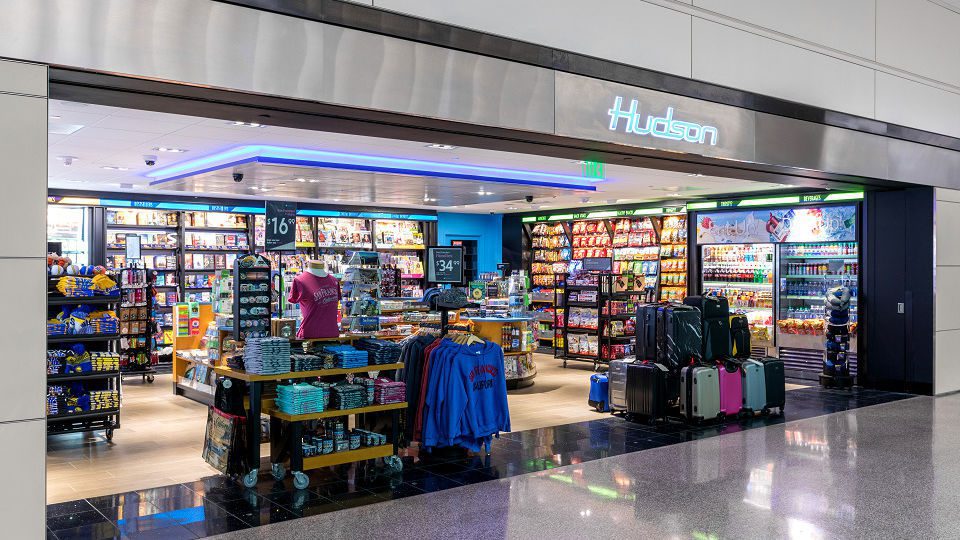At the beginning of 2020, Hudson kicked off its deployment of the Flooid platform to provide a new backbone for all transactions across its 1,010 travel convenience stores and specialty retail, which includes proprietary book and tech stores, duty-free shops and food and beverage concessions. Flooid will also support Hudson’s ecommerce initiatives in the future.
In March, the COVID-19 pandemic hit, and the $2 billion North American travel retailing giant was forced to temporarily close more than 700 stores, furlough the bulk of its workforce and cut expenses deeply.
“We went through a process of intense reopening over about eight weeks from mid-May to mid-July, which has since continued at a slower pace,” said Jordi Martin-Consuegra, EVP, Chief Administrative Officer and Deputy CEO at Hudson in an interview with Retail TouchPoints. Hudson worked with landlords — airports, commuter hubs and travel destinations — to decide which locations it made sense to reopen based on travel demand. The company is now operating approximately half of its locations.
Yet in the midst of taking hundreds of stores through a complex closing and reopening process, Hudson made a daring decision — not only to continue the deployment of the Flooid platform but to accelerate it.
“We were already on a very demanding timeline to implement the system across more than 2,000 points of sale in the U.S. and Canada when the pandemic caught us,” Martin-Consuegra said. “But we looked beyond the crisis and took advantage of it. Now we are going to finish ahead of time with a full deployment across all of our operations by the end of October. That will be 10 months from when we completed our pilot at the end of last year. We were expecting it to take closer to 15 months at best,” he added.
COVID-19 forced both Hudson and Flooid to come up with creative solutions for deployment and training on the new system. “Due to the pandemic, we couldn’t get people in the same room to be safely trained. We couldn’t ask technical personnel to travel to train others or to implement the software,” Martin-Consuegra said. “Working with the Flooid team, we were able to digitize the delivery of the software and the installation and implementation of the software, as well as to create learning solutions so that we could take 90% of the training online.”
Best known for point-of-sale technology under its former name PCMS, Flooid rebranded earlier this year to reflect its evolution into an open system that can handle transactions across retail and ecommerce, including mobile, and give retailers a single view of all activity.
“The reason we engaged in the deployment of Flooid was not only to have a strong point-of-sale solution, but also to have a single technology platform that allows us to sell through multiple channels and to create and implement new business models thanks to the agility we have with this solution,” Martin-Consuegra said.
Vending Machines Expand Sales Opportunities
One example of this agility came early in the pandemic, when the retailer decided to use vending machines to meet the previously unforeseen demand for personal protection equipment (PPE).
“We were able to implement vending machines across 27 airports in North America in the middle of the pandemic within three weeks,” Martin-Consuegra explained. “The fact that we have a unified technology allows us to use the same processes in terms of pricing, assortment, promotions, taxes, etcetera. We only have to deploy once and then we can execute through multiple channels.”
The vending machines sell Hudson’s proprietary line of PPE products, which includes hand sanitizers, nitrile gloves, multi-use thermometers, portable UV-C sanitizers for mobile devices and personal items, and face masks in disposable, KN95 and cloth forms.
Hudson also addressed infection prevention in its own operations. “We set up an emergency task force that made sure we had the cleaning procedures, signage and checklists to keep our stores safe,” Martin-Consuegra said.
One aspect of that project is to support contactless mobile payments and self-checkout. Hudson now uses a broader range of hardware, including mobile devices, for processing transactions, “but Flooid is the hub on which all of them converge,” he said.
“Hudson decided to be bold in the middle of the pandemic,” said Diane Palmquist, CEO for North America and Group Co-CEO for Flooid in an interview with Retail TouchPoints. “We started out going in one direction with Hudson, and they pivoted, innovated and challenged us. They kept pushing the envelope, wanting to introduce more innovative things and to try new things.”
Martin-Consuegra is looking forward to using Flooid to bring Hudson into the future, including through the addition of new mobile capabilities.
Hudson planned to launch a loyalty program this year called Blue for frequent travelers who rely on Hudson’s convenience stores in the U.S. and Canada. Because of the pandemic, the launch is now slated for 2021.
Blue will feature a mobile app that will transact using the Flooid platform. Among other things, Martin-Consuegra hopes to use the app to provide an airport version of BOPIS, where a member sitting at a gate or traversing between terminals can order snacks, drinks or souvenirs from Hudson News and pick them up later.
Hudson Undertakes Companywide Transformation
Until last year, Hudson was working with “an amalgamation of ad hoc legacy technologies” across its operations, including finance, inventory and order management, logistics and point-of-sale, Martin-Consuegra explained. “Hudson grew tremendously leveraging this technology to the max. We had people who knew what they were doing. They made up for what our technology couldn’t deliver, but the technology wasn’t helping.”
Digitizing those systems was one element of a larger companywide transformation project known as Hudson Next, which was launched in 2019.
“Our customers have changed, and their preferences have changed,” he said. “We have a vision to adapt our stores, and to go beyond our stores, to meet new customer expectations and shopping habits. That includes everything from how they transact with us, to what products we carry, to our store design, to our organization and to the way we collaborate with our partners in the technology area.”
As a partner, “what we hope to do is give Hudson more control over the customer experience while we take care of the computing on the back end and all of the data,” Palmquist said.
Flooid, meanwhile, relies on its technology partners to take it to the next level.
Palmquist pointed out that “having unified data and providing one single view of all of the data for Hudson and our other customers requires computing power that’s fast, secure and reliable, so we rely on Intel equipment,” adding that Flooid’s relationship with Intel goes beyond that of a typical supplier.
“Intel’s role in retail is not just as a provider of silicon product and technologies that will enable the silicon to be effective,” said Joe Jensen, VP of Intel’s Internet of Things Group and General Manager for Retail, Banking, Hospitality and Education. “We bring market understanding and guidance, as well as vision and future thinking to our partners. We believe that helps solution providers like Flooid to enable customers like Hudson to achieve the results they have.”













